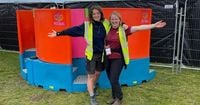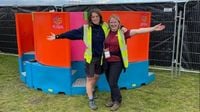In a groundbreaking initiative at the TCS London Marathon, thousands of women will contribute to sustainability efforts by recycling their urine into valuable fertiliser for wheat. This year, the event will see the collection of over 1,000 litres of urine through PEEQUAL's innovative women's urinals, which are designed to be 2.7 times faster to use than traditional portable toilets.
The collaboration between PEEQUAL, a start-up founded by Amber Probyn and Hazel McShane during their studies at Bristol University, and NPK Recovery, a fellow Bristol-based company, aims to reduce the carbon footprint of the marathon while providing a practical solution for waste management. The urine collected will be processed into liquid fertiliser, which is rich in nitrogen and essential for crop growth.
According to the founders, the urine collected will be used in field tests to evaluate its effectiveness as fertiliser. This volume of urine has the potential to support the growth of wheat sufficient to produce approximately 195 loaves of bread. "We love coming to the TCS London Marathon because we firmly believe that women shouldn't have to choose between starting their race on time or waiting to go to the loo," said Amber Probyn, co-founder of PEEQUAL.
Runner Susan Farrell, who is participating in the marathon to support the NSPCC, expressed her enthusiasm for the initiative. "It's brilliant to think that the nervous wees of thousands of women are helping a good cause," she said. Farrell, who previously used PEEQUAL's urinals at Glastonbury, appreciated the design that ensures privacy while reducing wait times. "I used to watch guys breeze through and think, 'Why can't we have that?' Now we do, and I really hope we get to see them at more events," she added.
The partnership with NPK Recovery is particularly noteworthy as it employs bacteria to recover naturally occurring nutrients from the urine, transforming what is typically considered waste into a resource. Hannah Vandenbergh, founder of NPK Recovery, stated, "Urine doesn't have to be a waste product and we're excited to be playing a small part in helping support the sustainability commitments of the iconic TCS London Marathon. Ultimately, we want to help event organisers all over recycle their urine and reduce their carbon footprints."
Kate Chapman, head of sustainability at London Marathon Events, highlighted the importance of finding sustainable uses for waste generated during the event. "Part of our environmental strategy is to try and find an 'onward use' for all waste that is generated at our events, for instance composting, reusing, upcycling and much more besides. We are delighted that the urine from the PEEQUAL urinals can be used for something so positive rather than going to waste," she said.
This initiative marks the third year of PEEQUAL's presence at the London Marathon. The company has made significant strides in improving the experience for female runners, ensuring they have access to facilities that meet their needs. The urinals, which will be positioned at the marathon's yellow start line, aim to alleviate the long queues that often plague traditional portable toilets.
In a broader context, this project exemplifies how innovative thinking can address environmental challenges while enhancing the experience of participants in large-scale events. The success of this initiative could pave the way for similar projects at future events, promoting a culture of sustainability and resourcefulness.
As the marathon approaches, excitement builds not only for the race itself but also for the positive impact that participants will have on the environment. With over 53,700 finishers in last year's marathon, if all of their urine were recycled, it could fertilise enough wheat to bake approximately 3,142 loaves of bread, according to NPK Recovery. This statistic emphasizes the potential scale of impact that such initiatives can have.
Overall, the collaboration between PEEQUAL and NPK Recovery highlights a creative approach to waste management in the context of one of the world's most popular marathons. By transforming urine into fertiliser, they are not only reducing waste but also contributing to food production and sustainability efforts.
As more events consider similar strategies, the hope is to inspire a shift in how we view waste and its potential uses. The London Marathon is not just a race; it's a platform for innovation and change, proving that even the most ordinary aspects of life, like using a toilet, can be transformed into something extraordinary.


